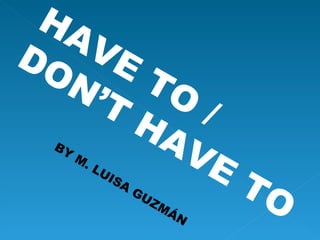Have to don't have to 8┬║ - ppt
- 1. HAVE TO / DONŌĆÖT HAVE TO BY M. LUISA GUZM├üN
- 2. We use ŌĆ£have toŌĆØ to say that it is necessary or very important to do something. IŌĆÖm late. I have to go now. You have to be careful when you ride your bike in traffic. We have to be at school at 8:30. Their computer is broken, so they have to get a new one.
- 3. With a third person singular subject (he, she, it) we use ŌĆ£has toŌĆØ. Jimmy is very ill ŌĆō He has to stay in bed. My mother has to go to London tomorrow for a meeting. If she wants to be successful she has to be determined. If she wants to be successful she has to have a dream.
- 4. We use the negative form: ŌĆ£ donŌĆÖt /doesnŌĆÖt have toŌĆØ to say that it isnŌĆÖt necessary or important to do something. It is early, so you donŌĆÖt have to hurry. The ticket is free ŌĆō You donŌĆÖt have to pay for it. My brother has got a motorbike, so he doesnŌĆÖt have to walk to work. Diana doesnŌĆÖt have to get up early on Sundays.
- 5. Questions are formed with ŌĆ£ do or doesŌĆØ. Do I have to go to school? Does he have to pay? Do we have to leave now? 4) The past form is ŌĆ£had to/didnŌĆÖt have toŌĆØ. Joanna had to go to the dentist last week. Yesterday was a holiday, so we didnŌĆÖt have to go to school. Did you have to do the ironing last night? 5) All forms of ŌĆ£have toŌĆØ are followed by the base form of the verb.




